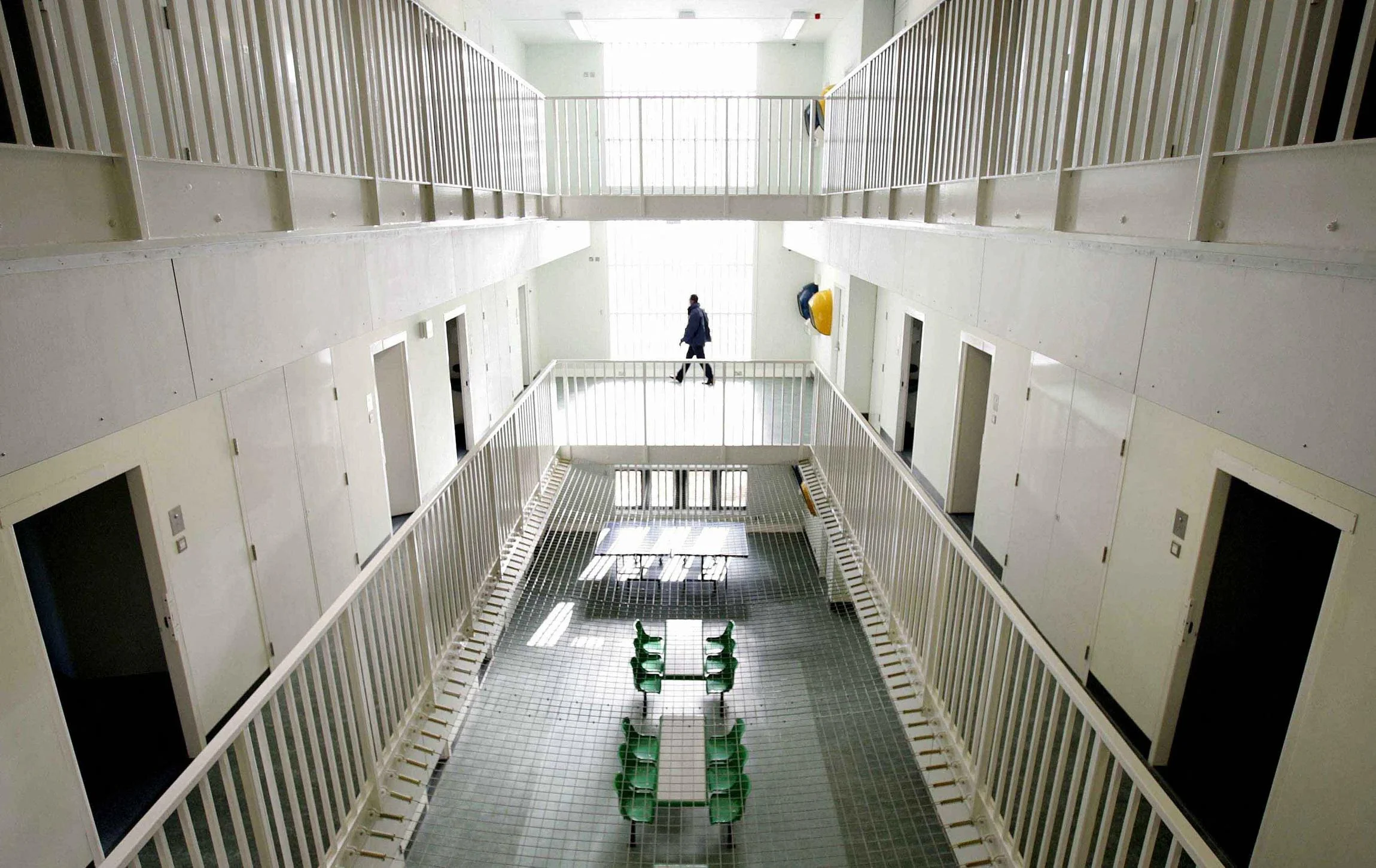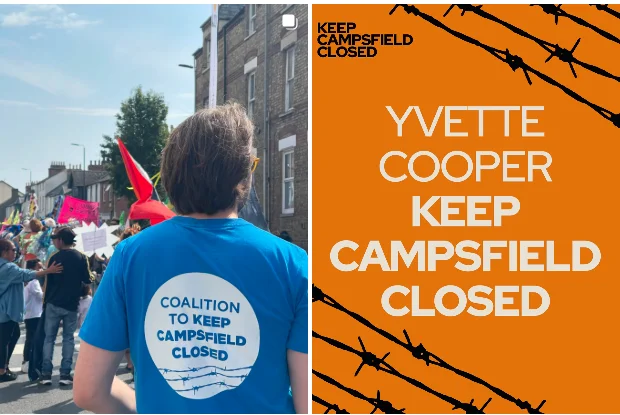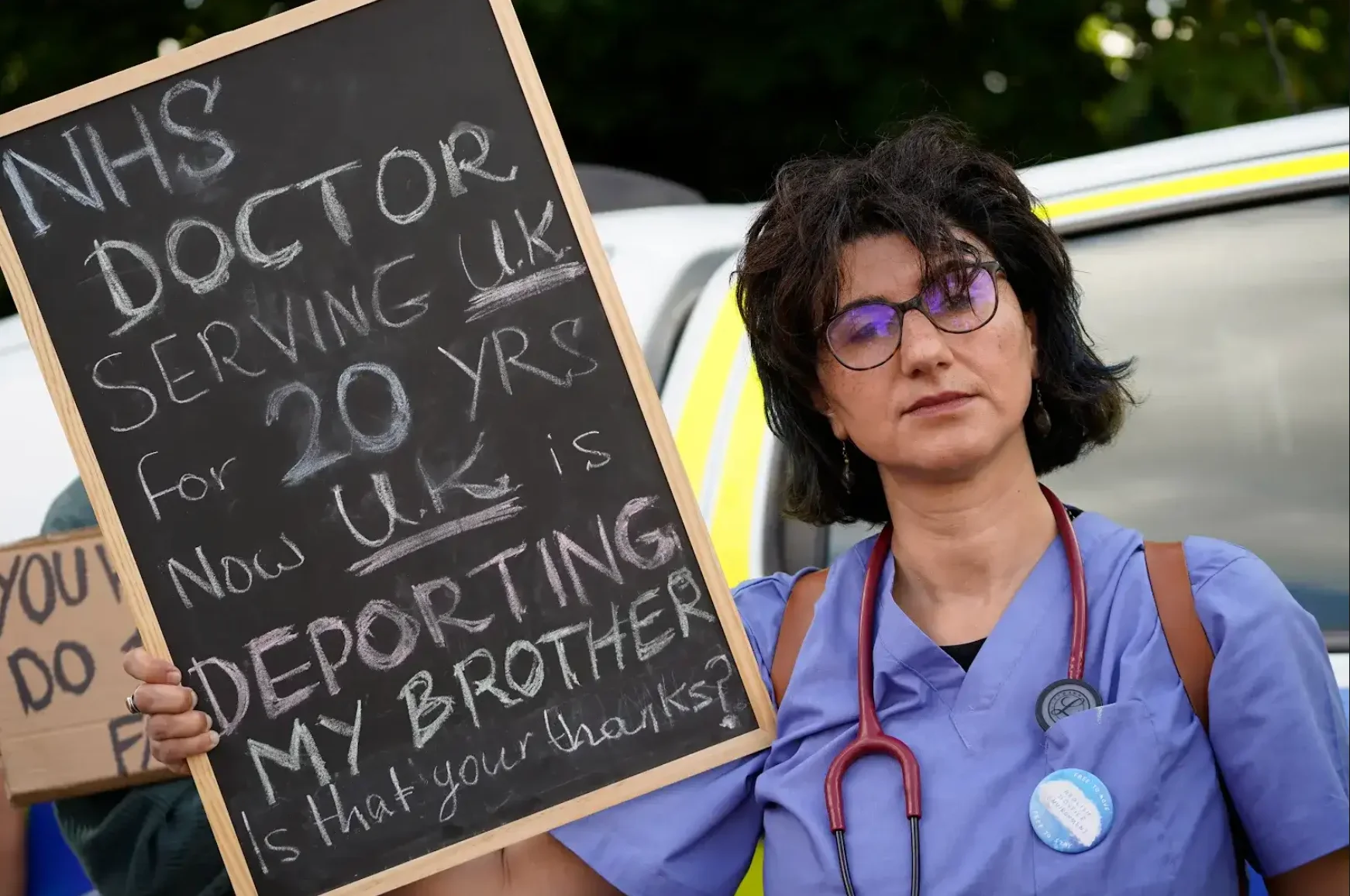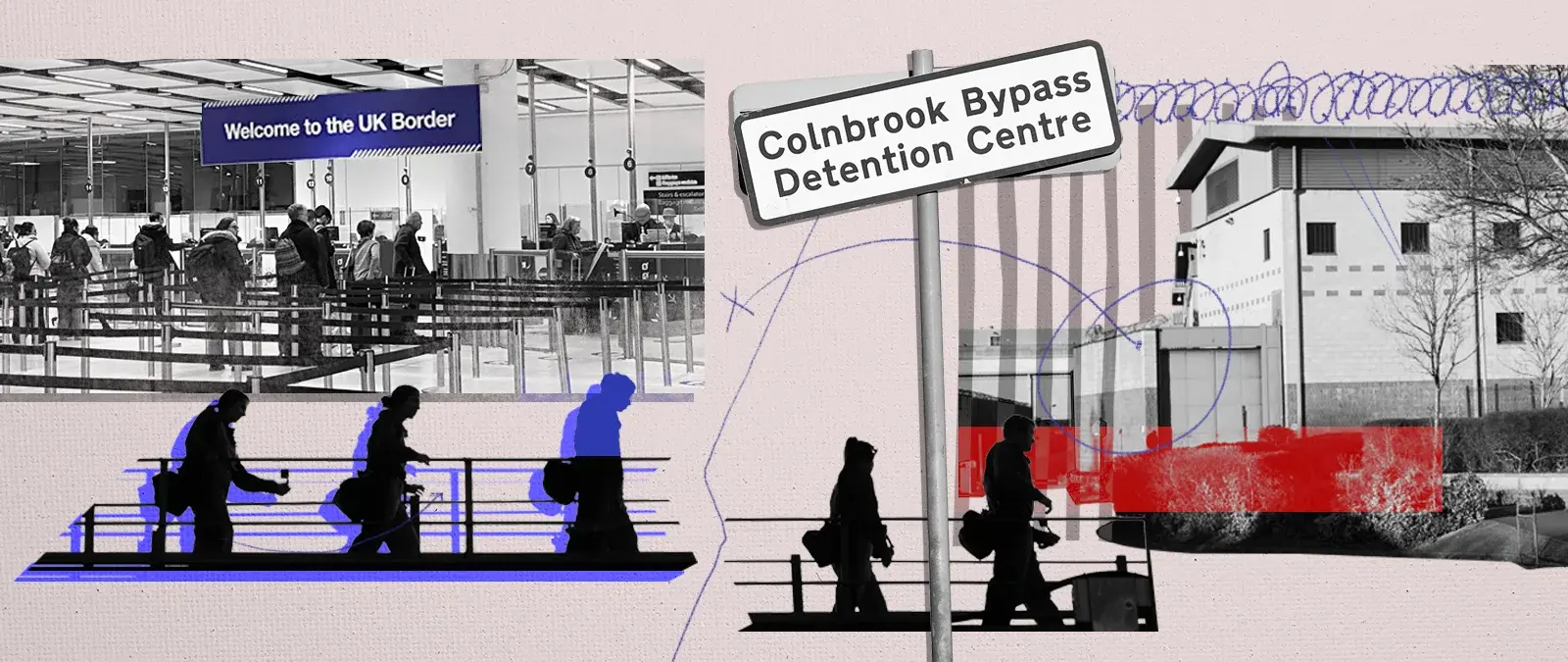“There's a saying that those in prison countdown the days and people in detention count up the days Because it's indefinite. We're the only country in Europe with indefinite immigration detention.” This is Sam Price, CEO of Beyond Detention, an organisation which provides support to detainees at the Yarl's Wood immigration removal centre in Bedford.
Like this one, many organisations both inside and outside the country are calling for a time limit on the detention of immigrants in these centres due to the psychological harm that can be caused not only by the detention itself but also by the uncertainty of not knowing when they will be released. Also due to the physical impact: in 2022, the last full year for which Maldita.es has data, 411 incidents of self-harm were reported in these centres and short-term detention facilities in the United Kingdom. There have also been several cases of suicide in recent years
In addition to setting time limits, many organisations are calling for alternatives to immigration detention. They argue that these alternatives would be more effective and less costly than the current detention system. One successful example, according to several organisations, was the project developed by the King Arms Project, in Bedford, which consisted of offering immigration advice, as well as receiving comprehensive support to help them with different aspects of their lives.
Being an immigrant in the UK after Brexit
This article is the fourth and last article of an international investigation conducted by Maldita.es (Spain) and Funky Citizens (Romania). The project explores, in four articles, the difficulties experienced by immigrants in the United Kingdom after Brexit, both those who already resided there and those who arrived later, especially those from EU countries, with a special focus on Spanish and Romanians.
Thanks to the collaboration of different organisations and NGOs working to help immigrants, and based on the various testimonies of those interviewed for this investigation, we have compiled a radiography of the United Kingdom's immigration system after Brexit came into effect.
This investigation was supported by Journalismfund Europe.

Various organisations denounce the effect of unlimited detention on people's mental and physical health
Alexandru Costea, fictitious name, is a Romanian immigrant who spent a week in the detention centres of immigrants from Colnbrook, near London's Heathrow Airport. He claims to have felt psychological pressure from the questions he was asked daily and continuously while in detention. They wanted to know why he was in the United Kingdom, the country where his wife and children lived. It is not an isolated case; various human rights organisations have collected numerous testimonies where detainees explain how entering these centres can affect mental health: uncertainty, the situation of each person or the lack of a time limit, knowing when you enter a centre but not when you leave.
Already in 2013, the British NGO Medical Justice, which sends independent volunteer doctors to visit immigrants held in detention centres, spoke out about the harm that being detained without knowing when they'll be released can cause to an immigrant. They define mental illness as "the most significant problem for immigration detainees."
This damage has also been reported by other human rights organisations such as the Helen Bamber Foundation. “The 2009 review examining the mental health effects of immigration detention found that detainees had high levels of anxiety, depression, and post-traumatic stress disorder,” they explain in a report, adding that suicidal ideation and deliberate self-harm were also common. Furthermore, they insist that "the severity of distress" was greater in those detained for longer periods.
The Council of Europe's Anti-Torture Committee (CPT) after a visit to various immigration detention centres such as Brook House or Colnbrook, stated in a report of 2023 that "the very fact that there is no maximum period of detention and that people can be detained for several years is a trigger for the development of mental illness, regardless of the fact that the vast majority of people spend less than 28 days in detention."
From January to September 2023, 291 incidents of self-harm were recorded in immigration detention centres across the country, according to a transparency request from a user to the British National Health System (NHS), available on the tool for processing and consulting requests for public information in the United Kingdom, WhatDoTheyKnow. The previous year, 2022, there were 411 incidents in the twelve months. These data do not reveal the type or severity of the incidents, but they do indicate how many cases required medical assistance. In 2023, 92.8% of those cases (270 of 291) required referral to healthcare specialists, according to the aforementioned data.
In recent years various media outlets have also echoes this immigrant suicides inside detention centres. One of them was Frank Ospina, a Colombian immigrant who was found dead in 2023, a month after entering the immigration detention centre. According to the BBC, Ospina was a 39-year-old engineering graduate who went to the United Kingdom to visit his mother, who lived there, and also took advantage of the trip to visit universities.
"After finally deciding to enroll in a master's degree in Spain, which was scheduled to start months later, he accepted a short-term job washing dishes, even though, as a foreigner, he wasn't authorized to work in the United Kingdom," the British public broadcaster's article states. In a raid on his workplace, he was arrested and sent to Colnbrook Detention Centre, the same centre where Alexandru Costea was held and the third with the highest number of self-harm incidents recorded between January and September 2023.
He remained there for a month until he took his own life. Ospina, according to a report of the UK Prison and Probation Ombudsman, the body that conducts independent investigations into deaths in state custody, “was being monitored through suicide and self-harm prevention procedures and should have been reviewed twice an hour.” However, according to the report, this did not happen, even though the prison officer recorded having done so. Added to this is the fact that, according to the independent investigation, "the centre's staff should have alerted the Home Office to review whether Ospina's continued detention was appropriate," something they claim didn't happen.
The Ombudsman currently has two other investigations underway on the deaths of an Albanian man and a French man, both of which occurred at the Brook House immigration detention centre near London's Gatwick Airport.
This centre was the protagonist, in September 2017, of an episode of the BBC program 'Panorama' entitled "Secrets of Immigration in Britain. The program showed hidden camera footage taken by an officer at the centre. According to a report published by Bail for Immigration Detainees, it “exposed numerous incidents of verbal and physical abuse of detainees by officers, including one incident in which an officer appeared to choke a detainee who was under constant surveillance at the time due to suicide risk.” “Medical staff and other detention officers could also be seen discussing how to cover up the assault,” they added.
Following the BBC broadcast, the first public inquiry was opened related to abuse and mistreatment of people detained in these centres in the United Kingdom. The inquiry made 33 recommendations on the detention of immigrants to prevent similar episodes from recurring. In September 2024, the BBC reported on statements from the head of the inquiry, Kate Eves, in which she denounced that “the Government has only accepted one of the 33 recommendations made in the public inquiry.”

Mental health also featured heavily in a report, published in 2016, on an independent review of the welfare situation of vulnerable people in detention in the country. It was conducted by Stephen Shaw, an independent complaints assessor for the Crown Prosecution Service who previously served as the Prison and Probation Ombudsman for England and Wales. The mental health impact part of that report was led by Mary Bosworth, professor of criminology at Oxford University. and author of books such as "Supply Chain Justice: The Logistics of British Border Control", where she talks, among other issues, about the precariousness to which many of the workers who safeguard the country's immigration system are subjected, partly privatized and managed by two large groups: Serco and Mitie. In Shaw's report, Bosworth stressed the impact of detentions on mental health and how it can worsen as the time of detention is prolonged.
Shaw's investigation concludes with 64 recommendations that the British government should implement in order to improve the well-being of vulnerable people in immigration deportation centres. Of the 64 recommendations, the British Home Office states in response to a transparency request from Maldita.es that it agreed to incorporate 57 recommendations but rejected 7: among them, absolutely excluding pregnant women from detention, reviewing the internet access policy in immigration deportation centres to facilitate immigration procedures for detainees (such as asylum applications) and to enable them to communicate with their families. Another rejected recommendation was to regularly publish statistics on the transfer of people between short-term detention centres and immigration deportation centres (currently, only the arrival of immigrants to the first centres they go to is published, and monitoring is not possible, as noted by the Oxford University Migration Observatory).
This lack of transparency in the data also makes it difficult for the different organisations that visit and provide assistance in the centres. Immigration detention centres, such as Beyond Detention. “We often don't know why people leave the centre. We don't know if they've been sent back to their country of origin or released. And that's very difficult for our team because we don't get any closure on the cases,” says CEO Sam Price.
Of the 20,422 people released from immigration detention in the UK in 2024, 34.2% were detained for more than 28 days
Sam Price, CEO of the British NGO Beyond Detention tells Maldita.es about her experience during the three weekly visits he makes to detained immigrants at the Yarl's Wood centre in Bedford, one of the seven immigration detention centres currently open in the UK, not counting short-term detention centres. “We visit people week after week, and we see how everything changes: their body language, their attitudes,” she says.
One of the cases where she felt the impact most was a man who, she says, had been detained for around two years: “He had the whole one side of his face sort of fell. The impact was physical but I think it was completely related to his mental well-being.” Now, she says, he is out of the centre, in a wheelchair and waiting for the British Home Office to decide on his asylum application. She also mentions the consequences of detention for many women. “Physically, their menstrual periods also stop when they’re there,” Price notes.
Recommendation number seven, of the 33 recommendations the public inquiry into Brook House, concerns the length of detention of immigrants in these centres. “The government must introduce legislation that sets a maximum time limit of 28 days for the detention of any individual in an immigration deportation centre," it says.
The Liberty Human Rights organisation also agrees with this 28-day limit in an article: “Medical evidence shows that mental health deteriorates after just one month of detention, but many people in immigration detention centres remain detained for months, some even years.”
According to a publication about arrests in the United Kingdom, from the Oxford University Migration Observatory, other British institutions and parties have called for a time limit on these detentions, as other European countries have. However, "ministers have argued that a time limit would make it difficult to remove people who have broken immigration laws and do not leave the United Kingdom voluntarily, including foreign criminals."
Where an individual is being detained in support of a return, detention may continue lawfully only for as long as there is a realistic prospect of removal within a reasonable time period, according to the Home Office Migration Statistics department.
This "reasonable period of time" is not defined and 34.02% of all migrants released from these centres in the United Kingdom in 2024 were held for more than 28 days, a slightly lower percentage than the previous year (35.3%). A further 2.8% spent six months or more waiting for a decision: to be released, deported or expelled to their home country, or released on bail, i.e., they remain free while their case is decided.
In the only country in Europe without a time limit on immigration detention, 20,604 people entered in immigration detention centre in 2024. Among these are immigrants from all countries, including the EU, who are considered "illegal" or "irregular," asylum seekers, or foreign criminals. This is 12% more than the previous year. In June 2024, in response to a citizen's public information request, the British Home Office stated that the person who had been detained in a centre for the longest period spent 1,131 days (more than three years). “The Home Office is currently processing this person’s deportation from the United Kingdom,” it concluded.

The countries of the European Union are subject to a directive which establishes a maximum detention period of six months, extendable to 18 in exceptional circumstances. Some Member States have reduced this time even further. For example, in Spain a stay of more than 60 days is not permitted and in France a maximum period of 90 days is established.
Stephen Shaw, in addition to his recommendations, concluded the report with a clear conclusion: “There are too many detentions; detention is not a particularly effective means of ensuring that those without the right to remain leave the UK; and many practices and processes associated with detention are in urgent need of reform.”
Multiple human rights organisations are calling for alternatives to detention: cheaper than centres and with positive effects on the physical and mental health of immigrants
Alternatives to detention are also not reflected in the closure of detention centres in the United Kingdom. There are currently seven active immigration detention centres in the country, but there could be nine in the future, as the government plans to open two more: Haslar and Campsfield, closed in 2015 and 2018 respectively. Many organisations in the country are campaigning to prevent their reopening: No Detention, No Haslar and Keep Campsfield Closed (Keep Campsfield closed.) “While I was in Campsfield, I saw so many people struggling with depression and a system designed to demoralize people. They treat you like you're a risk to society when all you're trying to do is achieve safety and build a life,” reads a statement posted on the campaign website.
In the case of Keep Campsfield Closed, it is a coalition of organisations working with immigrants, asylum seekers and refugees, suicide prevention and even Labour Party members in towns such as Kidlington and Yarnton, near the centre of Campsfield, in the County of Oxfordshire.
However, despite the fact that the reopening of both detention centres was announced by the previous Conservative Government in 2022, the current Labour government, led by Keir Starmer, intends to continue with these plans.

Back in 2018, Stephen Shaw, together with his team of experts, published a follow-up of the process implementation of its 64 recommendations. It applauded some progress but continued to add recommendations and call for improvements. “Some of what I say in the pages that follow reflects very well on the Home Office, the Department of Health and Social Care, and National Health Service England; however, I have found a gap between the laudable intentions of policymakers and actual practice on the ground,” the report began.
Shaw reiterates in both reports the need to seek alternatives to detention: “The well-funded and supported case management programs that offer legal advice, housing, and access to social and health care have high levels of compliance with all stages of the immigration system, including removal”.
In the UK, there are many organisations calling for alternatives to detention to be explored. One of them is Detention Action: "We need an immigration system based on cooperation, that respects people's freedom and guarantees them access to justice."
For the CEO of Beyond Detention, a successful alternative to immigration detention project was the one run by a local Bedford organisation, the King's Arms Project. “It was about offering legal advice so people could resolve their immigration issues without being imprisoned,” she explains.
It's a pilot project that has been widely studied and applauded by various organisations, one of which is the European Alternatives to Detention Network. “It aims to provide evidence on the effectiveness of implementing pilot projects on alternatives to detention in nine European countries,” says Carolina Gottardo, executive director of the International Detention Coalition, the organisation that coordinates the network. Among these countries is the United Kingdom.
The Bedford alternative to detention project was implemented with support from the UK Home Office and UNHCR, the United Nations High Commissioner for Refugees. "The King's Arms Project has helped 65 people access legal advice, 80% of these individuals were presented with viable options to regularize their immigration status in the United Kingdom”, explained the organisation on its website.
“There are three benefits and we are proving that it works,” Gottardo explains to Maldita.es. “So the first thing is, of course, the well being and the human rights of the persons. Of course, anyone is going to be better in the community than in detention”. The second point, says Gottardo, is that alternatives to detention do not affect compliance rates. “Governments are always concerned about what happens if people don’t comply with immigration conditions, and what we’re trying to show is that alternatives to detention still have very good compliance rates because people can be in the community, have a case manager, be cross established and there's no need to detain them to resolve their case," she adds.
Finally, for Gottardo, the third point has to do with something that, she says, “also worries governments.” It is the cost of immigration detention. “The alternatives to detention,” she adds, “are much more economical”. According to an assessment carried out by the organisation that led it, King's Arms Project, is two-thirds cheaper than what it would have cost to send those people to an immigration detention centre.
Detention Action has also been running the Community Support Project since 2014, "an alternative to detention program that works with people who have experienced or are at risk of being detained." According to the results provided on its website, the project "has demonstrated that, when case management principles are followed, alternatives can work even in the most complex situations, including people with criminal records and difficulties with removal." They state that "95% of participants have not reoffended since joining the project, and 83% have successfully completed it."
What neither Carolina Gottardo nor Sam Price agree with is the electronic tag system that some governments sell as an alternative to detention. Sam Price says they had a case last year with a former Yarl's Wood detainee. She describes it as horrific. "A man from China was released with an electronic tag, but he had no accommodation, so he was on the street, homeless. It was winter, and there was snow on the ground. He had nowhere to charge his electronic tag. So he literally went to a police station and said, "Please arrest me because I'm violating my immigration bond." Yet, Price says, nothing happened.
Carolina Gottardo shares a similar opinion: “The United Kingdom is one of the countries that most uses digital technologies, such as electronic tagging and monitoring, and at the International Detention Coalition, we consider it de facto detention. It's a way of digitally detaining them, but it's not an alternative.” She believes these people feel stigmatized. “We know of cases of people who don't want to go out on the streets because they feel they're being treated like criminals. Some become withdrawn, which affects their physical and psychological health,” she adds. “It's not an alternative to detention, but rather an alternative form of detention,” she concludes.
Stephen Shaw, in his 2018 review report, stated that, according to experts publications, while it is an effective mechanism for ensuring compliance with legal restrictions, unless combined with the additional involvement of social workers, it does not contribute to community reintegration or reducing reoffending.
The pressure of the immigration system and the possibility of being expelled from the country can also affect the mental health of immigrants
"Everything is stressful. You can't sleep at nighttime, always thinking about the Home Office. Maybe they want to send you back home, today or tomorrow, you never know," says one of the testimonies collected by the Mental Health Foundation in a report on the mental health of asylum seekers and refugees in the country.
Immigrants, asylum seekers, and refugees awaiting a decision on their applications may experience moments of stress and trauma, the report explains, many of them coming from complex countries and situations such as war.

The Mental Health Foundation has also denounced the psychological stress experienced after “the racist riots of the summer of 2024”, caused after the murder of three girls in a multipurpose centre from the British town of Southport. “They had a terrible impact on the mental health of many people seeking asylum in the UK. Some people told us they were scared to leave their accommodation, risking further isolation, and others said they feared being attacked walking down the street simply because of the color of their skin,” they explained to The Guardian.
Other people feel that, due to their immigration problems that have them “in limbo”, they can lose all their rights, including residency, after having lived most of their lives in the United Kingdom. “Honestly, I haven't slept well since September last year because this situation is on my mind all the time,” Amparo, fictional name, tells us over a video call. She arrived in the United Kingdom from Spain in 1977, aged 19, and in 2024, when the doctor in Spain asked for her immigration status, she discovered that she should have also applied for the EU Settlement Scheme. Now, she is waiting for her immigration status to be decided in the country where she spent almost her entire life.

 2024 saw the highest number of detentions of EU citizens in the UK since Brexit, with more than 50% of all those refused entry at the border
2024 saw the highest number of detentions of EU citizens in the UK since Brexit, with more than 50% of all those refused entry at the border  “The family I was going as an au pair with told me I wouldn't have any problems”: when immigrants end up returned from the UK or detained after receiving bad advice
“The family I was going as an au pair with told me I wouldn't have any problems”: when immigrants end up returned from the UK or detained after receiving bad advice From facing a ‘hostile environment’ to difficulties accessing the online immigration system or delays in decisions: the reality for immigrants in the United Kingdom after Brexit
From facing a ‘hostile environment’ to difficulties accessing the online immigration system or delays in decisions: the reality for immigrants in the United Kingdom after Brexit